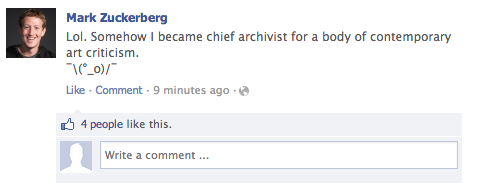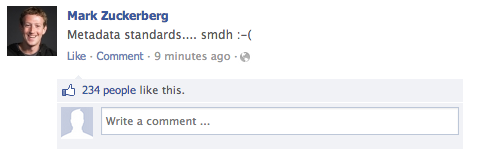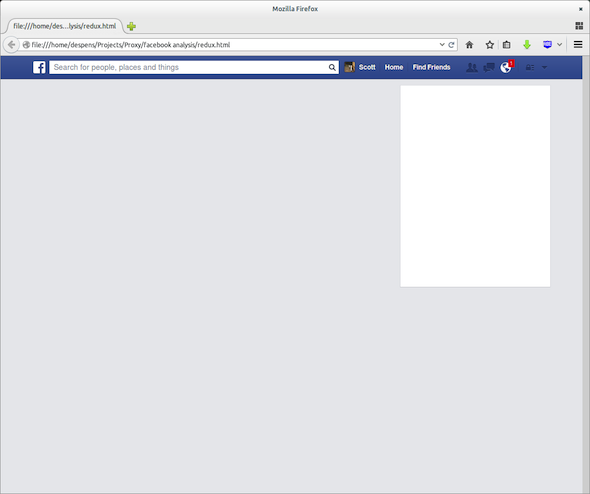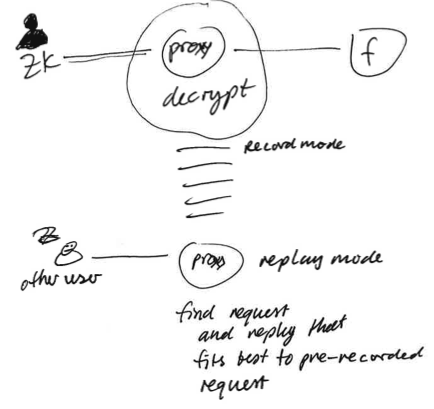![]()

In mid-January, a Facebook friend liked a status update, causing it to pop up in my News Feed; I've been avidly following its thread ever since. Now at 675 comments and counting, this rich exchange encapsulates the increasing importance of the art-related discourse that takes place on Facebook, and its precarity.
Los Angeles-based artist, writer, curator, and educator Micol Hebron initiated this conversation with a simple request:
Facebookers, what do you think of this: artist Joe Scanlan, an older white male artist, invented a fictional artist, Donelle Woolford, who is female, black, and seems a bit younger than he is. Scanlan hires actresses to 'play' Donelle for pictures and interviews, and he makes the artwork that she 'makes'. He began this project about 13 years ago. Donelle Woolford is in the 2014 Whitney Biennial. Here is an interview with Scanlan by Jeremy Sigler. Is this racism? Conceptual performance? Critical discourse on artworld hierarchies? Problematic exploitation? Discuss.
Critics, artists, former students, and, often, Scanlan himself responded, generating a thorough critique of the artist's practice, meaningful discussion about race and gender in contemporary art today, and a crowdsourced bibliography. Strikingly, its ebb and flow mimicked the public dialogue around Scanlan/Woolford in the art press—from curiosity (many had no idea of the project at the outset) to confrontation (stoked anew in May by The Yams' public withdrawal from the Biennial in protest), all in a slow burn. The texture and depth of this response evidenced Facebook's specific ability (for better and worse) to produce engaged networks and make visible their interactions.

The Scanlan controversy and the scale of this particular thread make it notable, but as Rhizome's Community Manager, I witness important conversations on Facebook every day. And they're all totally precarious. What we could identify as a significant body of critical writing is reliant on a monolith, one with a billion users, one that seems vast and infallible—as vast and infallible as, say, MySpace or Geocities once felt. One day Facebook will either cease to exist or have evolved to a point where its "legacy" content can no longer be maintained.
So if we can't rely on Facebook to do the job, how will this valuable material be preserved? This is something we've discussed at some length at Rhizome, where digital legacy is a frequent topic of conversation. According to our digital conservator Dragan Espenschied, this is a particularly complex problem because Facebook conversations aren't objects, which can be easily captured and stored, but practices performed by human users and software.
"All of the detail of this conversation is in who liked whom and who is friends with whom," Dragan notes. Every thread can be liked, as can individual comments. In the case of the Scanlan/Woolford, thread likes can indicate basic endorsement of the conversation, whereas comment likes can delineate affiliation around a given position.
But archiving likes is very difficult. A full list of likes can only be accessed via the Facebook software by clicking through to a pop-up. So screen grabbing—a fairly intuitive way to document the web—proves wholly inadequate for Facebook conversations. One would need to go through and screen grab every minute interaction. And in end, what one is left with is passive documentation, nothing remotely akin to the experience of the website.
Nor, like many webpages, can a Facebook page be downloaded. Facebook doesn't present a simple HTML page to be saved; it presents software that is executed on the user's computer, that through constant interaction with their servers, constructs something that can be rendered in a browser and looks like a page. Facebook exists primarily through their users' interactions with it, calling up new material, of which there is much to be called.

Scrapable content served by Facebook (scripting removed).
To this complexity, there is no straightforward solution. But Dragan has devised a work-around that involves individuals accessing Facebook through a proxy server which records data from their interactions. When you access the web through this intermediary, it would record all of your actions and all of the actions of your browser—bringing up each name when you click on a given comment's likes, when you unfurl the thread revealing older content, when you move through to a pop-up photo, etc. By capturing user and software actions, the proxy server would treat Facebook conversations as practices, not objects.
Nonetheless, even this more comprehensive strategy has its drawbacks. For one, it relies on the erratic factor known as participation; someone will have to take the time to record relevant conversations. Additionally, one is more or less left spending time screen grabbing by a different name—to record an entire thread, one would need to call up every element of that thread (a lot of clicking at 675+ comments), and to revisit the thread whenever new comments are added. Not least, Facebook's privacy controls complicate our understanding of a "complete" record—users may not see comments that are hidden from them, which could omit crucial points, and, by the same token, users might capture and share comments which were only intended to be viewed by a small circle of friends.

Jotted Notes by Dragan Espenschied
To quote Dragan, "The worst cases require the worst tools...this just shows what a terrible system Facebook is to do anything." But for now, this is the proposal we have, and though it has drawbacks, it would be a major step forward. (In fact, Dragan is working to realize this add-on as I write.) Moreover, this situation is a reminder that archive-worthy material all the time occurs in, shall we say, archival environments that are not exactly optimal. Figuring out how to save what's important, preserving access and authenticity, especially as more and more conversation migrates to closed forums with dynamic interactivity like Facebook, will continue to challenge the efforts of all with a vested interest in contemporary criticism.
Mark Zuckerberg status update screenshots were created for satirical purposes and do not represent his actual opinions.
See also: To Bind and to Liberate: Printing out the internet by Orit Gat and I (No Longer) Have a Web Site: Access, Authenticity, and the Restoration of GeoCities by Michael Connor.


Interesting post.
One must also consider the issue of online censorship as well as other limits placed on content. Javier Pulido and myself had an online institutional critique project, Kurizambutto, which was shut down by Facebook. This fell within the company's policies, but it is indicative of the fragility you discussed in your article.
Since we were mocking Mexico's foremost contemporary gallery and artist (Kurimanzutto and Gabriel Orozco), someone specialized in art law found a way to shut down our Facebook page and even one of our websites by using copyright infringement as an excuse. We were able to archive most of the page since we foresaw this was going to happen, but many of those interactions, images and likes have been lost.
Link to Kurizambutto's page at Rhizome:
http://rhizome.org/portfolios/artwork/56916/
Thank you for sharing that, Mariana. And you're totally correct, it's not just the eventual move to 'legacy' that threatens important material hosted by the site. Other pressures clearly mount…
Another vulnerability, of course, is tech, which as resilient as FB seems is no distant threat. At one point in the Scanlan convo, I believe, some posts disappeared, only to reappear at a later time — apparently the delivery software buckling under the thread's scale. Who knows what could happen?
As for grinding my teeth over this post (see, Twitter) two months ago I wrote here ( http://rhizome.org/editorial/2014/mar/19/commenter-lament/ ) that if "Zachary Kaplan is zealously following and participating in conversations elsewhere, why not enlarge that role and have a mechanism in place to feed those discussions back into Rhizome? A kind of human-edited 'track back' function. Take 'Facebook content' and reclaim it for a non-profit commons (within the bounds of copyright law, if that's even possible)."
That doesn't mean Facebook itself isn't grind-worthy. It's pretty much The Devil, for reasons mentioned by Marianna Aguirre (above), Geert Lovink, and many others (Zuckerberg's LOL about art criticism – assuming it's not fake – ought to send a shiver up everyone's spine). Yet for whatever reason the new media community has embraced it and often hides critical judgments behind various layers of friend connection and the impermanence you've described here. Am all in favor of getting this out in the open, or at least, more open.
Tom, apologies, the pics were faked by Zach, I'm adding a clarifying caption. Thanks for clarifying your position - I'm sorry for incorrectly characterizing it!
I thought it was probably a joke but it still gives me the willies. Good work, Zach.
reading that fb thread with text-to-speech. Lol it started on Jan1, sometimes u need a holiday to get this kinda thread off the ground. I have read up till May 1 and thats only 33%!
also lol that so many comments are edited, maybe ill try to look through the revision history on each of them.Then a few ask how to link to the thread cuz they can never find it on their feeds and have to scroll through people's profile too far to find it. Then OP decides to make it a note and link to it that way, then some one tries to make them feel dumb they dont realize the link is the timestamp.
At times it is as ferocious at a PirateBay thread.
Here is a specific example and a question about how this Facebook proxy would work.
According to Paddy Johnson ( http://artfcity.com/2014/05/23/friday-links-a-wall-of-dicks-and-some-internet-bickering/ ), Marisa Olson recently "took her complaints to Facebook" about a show she curated that was cancelled by a commercial gallery. Johnson links to the post ( https://www.facebook.com/marisaolson/posts/10151999971306442 ) but when I, as a non-Zuck, click it I see a broken thumb icon and the words: "Sorry, this page isn't available. The link you followed may be broken, or the page may have been removed." Johnson says the link is correct and wonders if I have to be Olson's friend to see the post. I have no idea and this is normally the point that I go look for something more interesting on the internet.
My question is, will this Rhizome feed be a record of Zachary Kaplan's friends' activities? Not that there is anything wrong with that, if he's the person volunteering to do the difficult work of monitoring Facebook discussions, but I'm wondering how (or whether) Rhizome accesses a newsworthy or much-discussed event if the author is shielding it from public discussion by publishing only to a network of friends.
Good qs, and Paddy's post was a perfect example of the limits of sharing FB writing — Dragan had the same problem as you that day. :-)
As to your specific questions, can I say "more soon"? Without committing ourselves to any particular policy, know that the interest in the tool is not as an extension of my surfing as Community Manager (or any other Rhiz staff's), but to make it possible for others to authentically (or as authentically as possible) archive what they're seeing.
Since Facebook is simply not designed for archival purposes, the larger question becomes, why not use a content management system such as Wordpress for purposes of recording and indexing dialogue? It is also possible to integrate Facebook into Wordpress comments, and I wonder if this might resolve the issue if Facebook needs to be used.
In sum: there are such powerful tools for discussion forums, but they are underutilized. I have seen Facebook used for serious online discussion, particularly in group pages, but it is horribly inadequate for this purpose.
Or, it is horribly adequate if you want to vent to a few friends and not have a permanent searchable archive of your comments. (Assuming Facebook doesn't then blow another set of privacy seals, as it has been known to do.)
The decision to move new media discussion, announcements, etc to Facebook has already happened. The larger question is what does the "public sphere" mean when so many people have elected to use a system of Byzantine complexity with complex code and constantly shifting rules and allegiances. Is Rhizome the public sphere, attempting to collect this material, or is Facebook, where the discussion is happening in real time?
And in reply to Zachary above – "more soon" is fine. It's great that you're tackling these issues.
testing the proxy